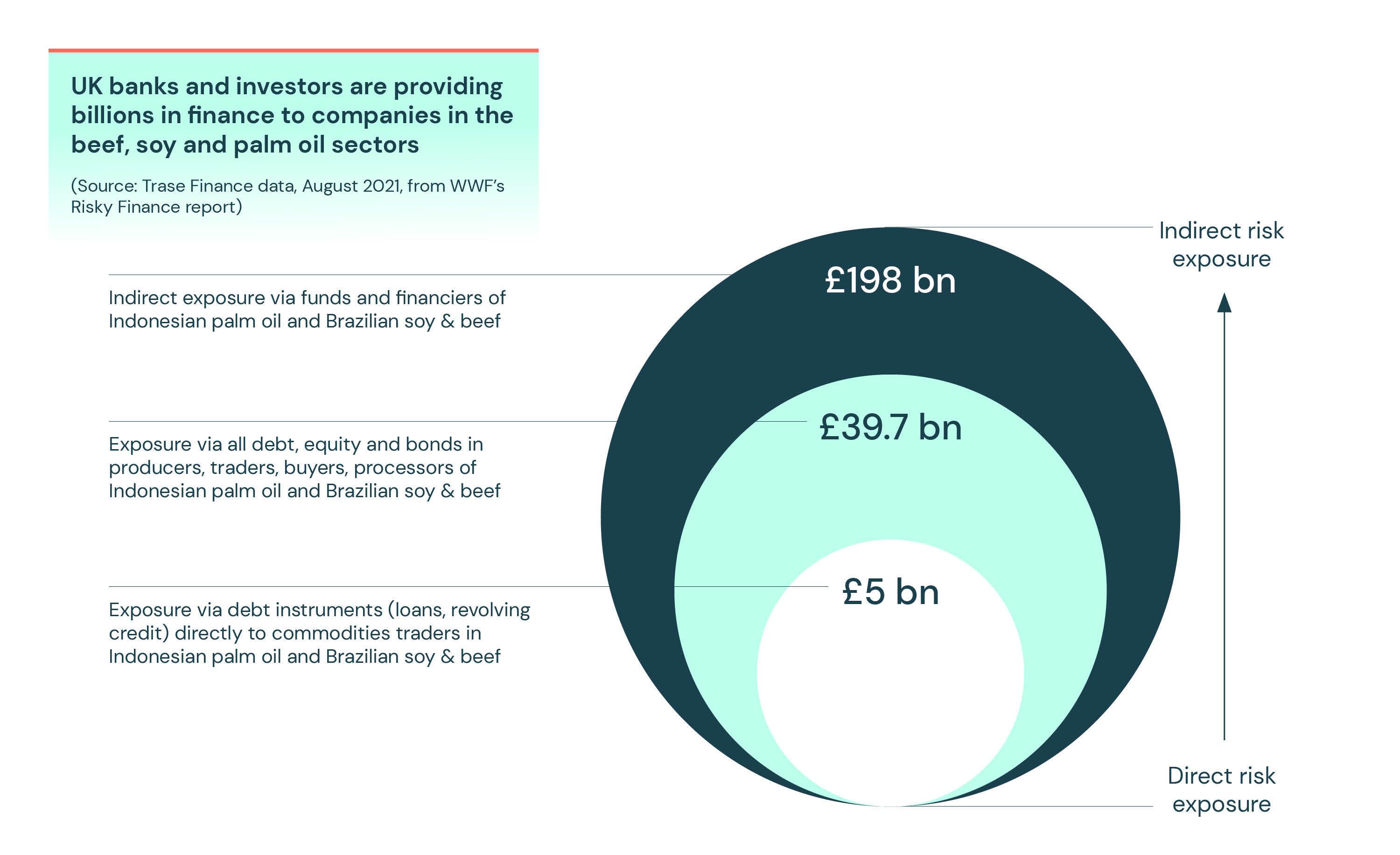Trase highlights UK’s role in financing deforestation
UK financiers provided over £40 billion to companies at risk of causing deforestation in Brazil and Indonesia through their trade in beef, soy and palm oil, according to analysis by Trase Finance.

The analysis forms the centrepiece of WWF’s Risky Finance report, published in September, which assesses the UK financial sector’s exposure to deforestation.
WWF says that just over a quarter of tropical deforestation is driven by global demand for agricultural commodities such as beef, soy and palm oil. UK demand for such commodities requires an area equivalent to 88% of the total UK land area in 2016-2018 – a 15% increase on 2011-2015. This is responsible for 28 million tonnes of carbon emissions per year, comparable to 7-8% of the UK’s offshore carbon footprint in 2016.
Trase Finance’s analysis included more than 500 financial institutions and 2,800 funds based in the UK with exposure to companies producing, trading, processing, buying and financing Indonesian palm oil and Brazilian soy and beef through their lending and investment. It covers equity, bonds, loans and revolving credit facilities as of August 2021.
Bankrolling deforestation
The analysis shows that £5 billion of financing was provided through loans and revolving credit directly to commodities traders in Indonesian palm oil and Brazilian soy and beef. When equity and bonds are included, the amount of finance climbs to £40 billion. If indirect investment via funds and other financiers is included, the UK finance sector’s exposure increases to £200 billion (see figure).

The figures are likely to be an under-estimate because of the lack of transparency of financial data. For example, while public syndicated loan data is available, the non-public corporate loan portfolio of banks is not, so only a fraction of the overall loan portfolio of banks can be identified.
ESG funds found wanting
Trase also found deforestation-risk holdings in some UK-based ESG funds worth some £800 million. Such funds are supposed to direct finance towards companies that meet environmental, social and governance (ESG) performance criteria. The presence of deforestation-risk holdings in ESG funds indicates that many lack screening criteria on deforestation and other nature-based risks. While some ESG funds have climate-orientated criteria which favour carbon-efficient companies, ignoring deforestation – a major source of carbon emissions – is a serious oversight.
Not all companies in the commodity trade are causing deforestation, but the lack of transparency means it is difficult to judge. Data from Global Canopy’s Forest 500, shows that 43% of companies and financial institutions have not made commitments to address deforestation risk. Where they are present, they may be incomplete. For example, some may have a commitment covering legal deforestation, but it may not include all ecosystems or entities in the corporate group, or it may not have a deadline to achieve the commitment.
WWF calls on the UK government to strengthen proposed legislation in the Environment Bill by requiring all companies in the commodity value chain – including banks and investors – to conduct mandatory due diligence to prevent deforestation. At present the Bill only prohibits the importation and use of deforestation-risk commodities by companies, despite a recommendation by the government-commissioned Global Resource Initiative taskforce to include the financial sector. Similar EU draft legislation is also expected to exclude finance from its due diligence requirements.
Investing in solutions
Despite the reluctance of policymakers to take effective action, there is a growing recognition among businesses of the material risks to economic value from nature-related impacts such as deforestation. For instance, the Taskforce on Nature-related Financial Disclosures is creating a framework for companies and financial institutions to report and act on nature-related risks.
Trase Finance helps financial institutions respond to the growing need to understand and manage deforestation risks. It provides the data and tools that enable banks and investors to conduct due diligence on clients seeking finance and screen investment portfolios to ensure they are not supporting business activities that are driving deforestation, biodiversity loss and climate change.
“Trase Finance provides granular data on deforestation risks associated with commodities trading companies which enables banks and investors to go beyond simple exclusion rules and engage with companies to drive real improvements on the ground in producing countries like Brazil and Indonesia.”
Trase lead Helen Bellfield, who provided research for the WWF report


